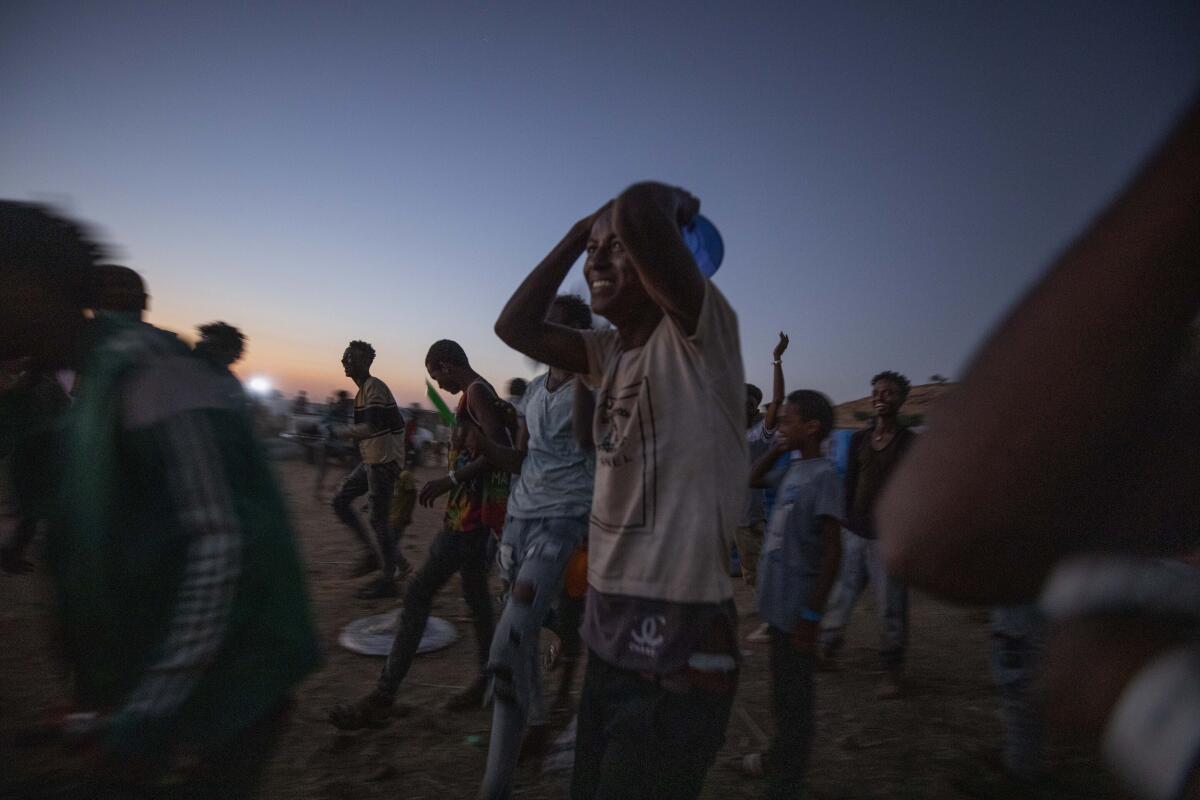Ethiopia declares victory as military takes Tigray capital

- Share via
NAIROBI, Kenya — Ethiopia’s military has gained “full control” of the capital of the defiant Tigray region, the army announced Saturday, after the Tigray government reported that the city of a half-million people was being “heavily bombarded” in the final push to arrest the region’s leaders.
“God bless Ethiopia and its people!” Prime Minister Abiy Ahmed said in a statement declaring that the taking of Mekele marked the “completion” of the military offensive that started nearly four weeks ago. “We have entered Mekele without innocent civilians being targets,” he said.
Now, he said, police will pursue the arrest of the leaders of the Tigray People’s Liberation Front, who run the region and dominated Ethiopia’s ruling coalition before Abiy came to power in 2018 and sidelined them among the sweeping reforms that won him the Nobel Peace Prize.
Abiy’s government has since accused the TPLF of inciting unrest in the country and seeking to reclaim power, and each government regards the other as illegal. Abiy has rejected dialogue with the TPLF leaders over the past month, including during a Friday meeting with three African Union special envoys.
“We now have ahead of us the critical task of rebuilding what has been destroyed ... with the utmost priority of returning normalcy to the people of the Tigray region,” Abiy said.
Some Ethiopians at home and in the diaspora rejoiced at the news that Mekele was under the military’s control. “Praise God for his mercy upon us. Thanks to the Almighty God our creator. Amen. Let peace prevail in Ethiopia!!!” former Prime Minister Hailemariam Desalegn tweeted.
The fighting has threatened to destabilize Ethiopia, which has been described as the linchpin of the strategic Horn of Africa, and its neighbors.
As international alarm has grown since the conflict began on Nov. 4, so has a massive humanitarian crisis. The Tigray region of 6 million people has been cut off from the world as the military pursued what Abiy called a “law enforcement operation” with airstrikes and tanks.
Food, fuel, cash and medical supplies have run desperately low. Humanitarian and human rights groups say several hundred people have been killed. Nearly 1 million people have been displaced, including more than 40,000 who fled into Sudan. Camps home to 96,000 Eritrean refugees in northern Tigray have been in the line of fire.
With communications severed, it is difficult to verify claims by the warring sides. The Tigray leader, Debretsion Gebremichael, could not be reached Saturday evening. The heavily armed TPLF has long experience fighting in the region’s rugged terrain, and some experts had warned of a drawn-out conflict.
The TPLF turned churches, schools and densely populated neighborhoods in Mekele “into armament stores and launching pads,” senior Ethiopian official Redwan Hussein asserted in a Facebook post. He said “scattered remnants” of the TPLF fighters were carrying out “sporadic shootings” in neighborhoods.
The shelling that began earlier Saturday in Mekele, a densely populated city, immediately raised concerns about civilian casualties. Ethiopia’s government had warned Mekele residents there would be “no mercy” if they didn’t move away from the TPLF leaders in time. The United Nations said some residents fled as tanks closed in and Abiy’s 72-hour ultimatum for TPLF leaders to surrender expired.
Alarm spiked anew on Saturday as Ethiopian forces appeared to be realizing the “final phase” of the conflict.
“I invite everyone to pray for Ethiopia where armed clashes have intensified and are causing a serious humanitarian situation,” Pope Francis tweeted.
“Fighting and shelling in the Mekele area are a very grave concern. We urge an immediate end to conflict and restoration of peace in Tigray,” the top U.S. diplomat for Africa, Tibor Nagy, tweeted.
As Ethiopian forces moved in, Maj. Gen. Hassan Ibrahim warned that “it is possible that some of the wanted people may go to their families or neighboring areas and try to hide for a few days. But our armed forces, after seizing control of Mekele city, will be tasked to hunt down and capture these criminals one by one, wherever they may be.”
The United Nations continues to ask for immediate and unimpeded access for aid deliveries. The office of U.N. Secretary-General Antonio Guterres said he has “expressed his grave concern over the consequences of the Ethiopian conflict to the civilian population and over the spread of hate speech and reports of ethnic profiling.”
The conflict has further inflamed tensions in a country that the former Ethiopian government, dominated by the TPLF, structured along ethnic lines during more than a quarter-century in power. Massacres reported in the community of Mai-Kadra during the recent fighting have led to concerns about what else will be revealed once communications and transport links to Tigray are restored.
Among Abiy’s goals is welcoming back the refugees who fled, though many have reported being attacked by Ethiopian forces and now struggle to find food, shelter and care in a remote part of Sudan.
U.N. High Commissioner for Refugees Filippo Grandi on Saturday visited Sudan’s Um Rakuba refugee camp, which houses some 10,000 Ethiopian refugees. He said about $150 million is needed over the next six months to help Sudan manage the influx.
Worryingly, refugees have told the Associated Press that Ethiopian forces near the border are impeding people from leaving. Reporters from the AP observed crossings slow to a trickle in recent days. Ethiopia’s government has not commented.
More to Read
Sign up for Essential California
The most important California stories and recommendations in your inbox every morning.
You may occasionally receive promotional content from the Los Angeles Times.










